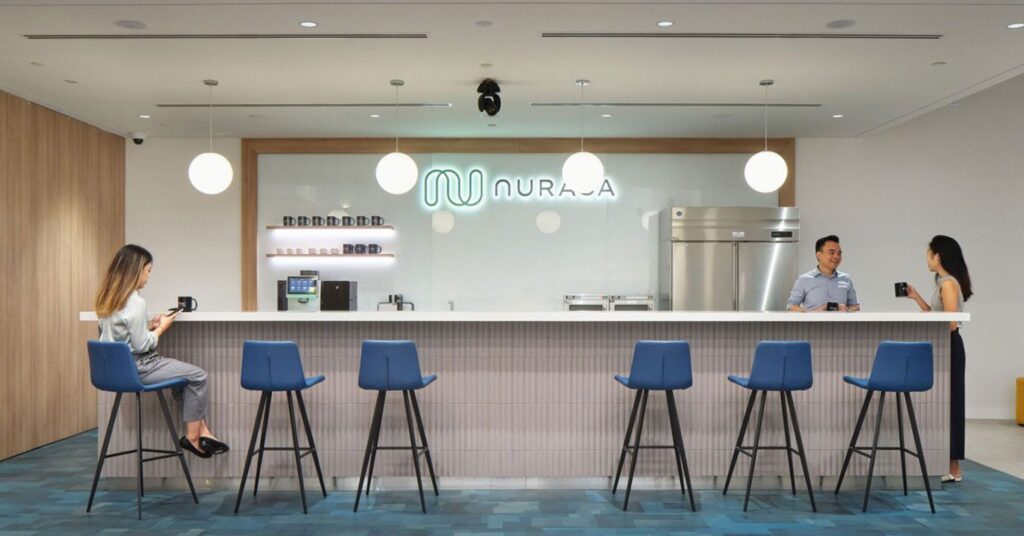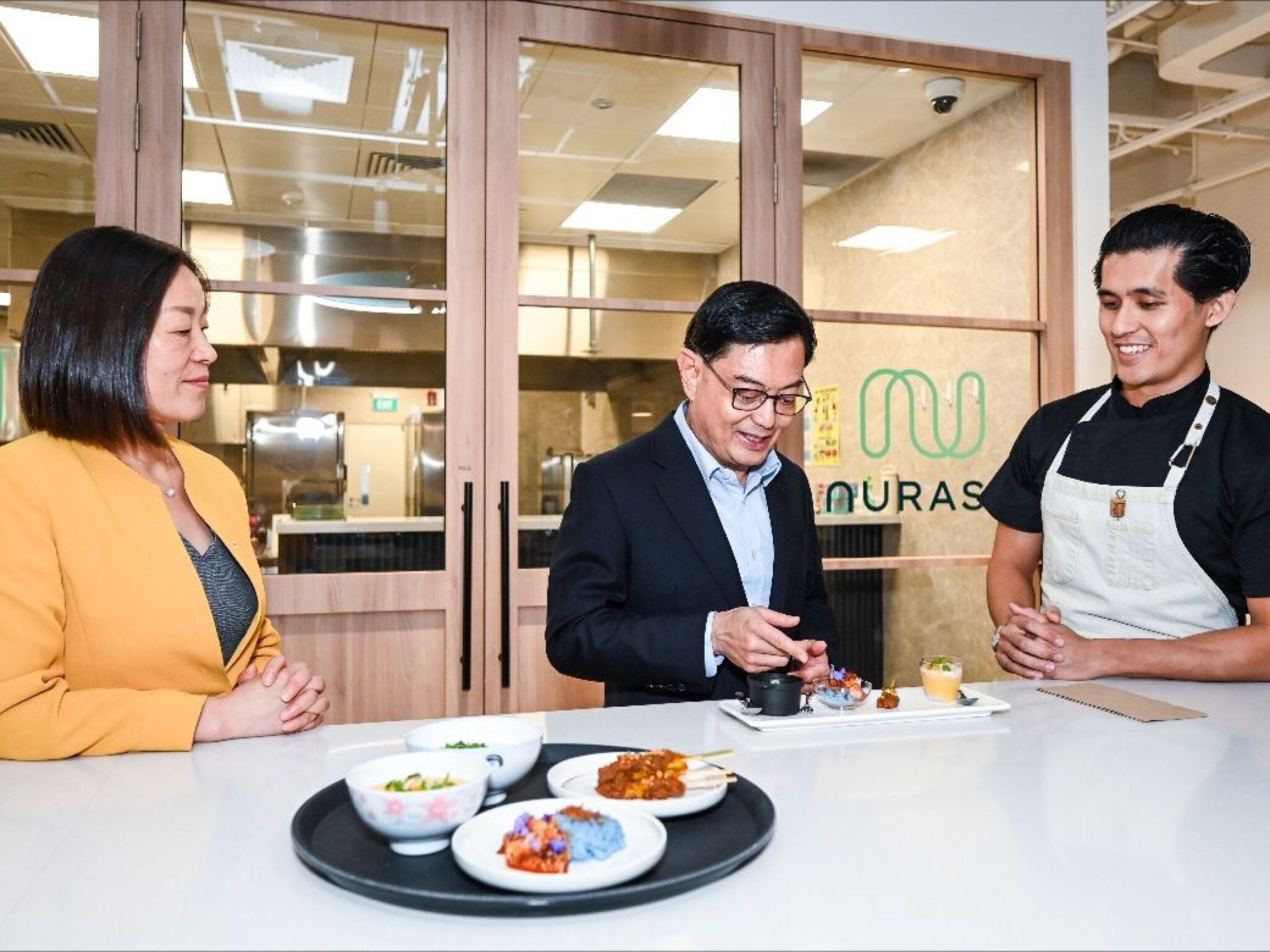Nurasa Opens Food Tech Innovation Centre in Singapore to Make Better Alternative Proteins, Quicker
4 Mins Read
Singaporean sustainable food production platform Nurasa has opened a Food Tech Innovation Centre to help alternative protein companies scale up production and enhance flavour and nutrition.
Nurasa, the sustainable food innovation platform owned by Temasek, last week inaugurated the Food Tech Innovation Centre (FTIC) in Singapore, a hub dedicated to the R&D and scale-up of alternative proteins.
Operational since 2023, the 3,840 sq m facility is located within Biopolis – the city-state’s innovation community – and features high-tech labs with plant protein extrusion and precision fermentation capabilities. They’re designed to help sustainable food manufacturers scale up their production processes and accelerate their paths to market.
“The centre provides a space for different companies to come together and innovate, which benefits not just Singapore but also the wider region,” said Singapore’s deputy prime minister, Heng Swee Keat, who was present at the FTIC’s launch.
Precision fermentation and HME labs unlock alt-protein potential

The FTIC features shared laboratories, collaborative workspaces, private suites adaptable for small offices, and labs where partners can co-create. It has two facilities with advanced capabilities that will allow alternative protein companies to speed up manufacturing. The first is a precision fermentation hub developed and operated by contract development and manufacturing organisation ScaleUp Bio (a joint venture between Nurasa and ADM) and the government-owned Agency for Science, Technology, and Research (A*STAR). This has bioreactors that have a capacity of up to 100 litres.
“Public-private partnerships can help accelerate innovation by kickstarting research and development in areas of emerging technology, facilitating talent exchange and minimising duplications in investments,” said Heng. “Doing so will enable more viable pathways to translation, commercialisation, and scaling for impact.”
Meanwhile, the second facility is owned by ScaleUp Bio and will serve as its new headquarters, focusing on high-moisture extrusion (HME) for plant proteins, with the goal of making meat analogues with superior texture and mouthfeel.
“At the Food Tech Innovation Centre, cutting-edge technology is at the heart of everything we do,” said Nurasa CEO Guo Xiuling. “Our facility enables us to challenge the status quo of the existing food system and develop solutions alongside our startup and corporate partners.”
She added that both labs can serve as small-scale production sites to make limited samples for market testing, allowing companies to tweak products based on consumer feedback at early stages, and eventually commercialise a public-ready product.
The FTIC will also serve as a hub for the NuFood Concept Studio, Nurasa’s open innovation platform for sustainable food development and commercialisation. The studio encourages consumer-centric food innovation and addresses areas like low-sugar, cholesterol-free and gut-friendly foods. Companies will be able to search for the newest ingredients, co-develop recipes based on market insights and the latest tech, and deliver accessible, adaptable and affordable breakthroughs to strengthen food security – Singapore’s 30 by 30 initiative aims to reduce import reliance by producing 30% of all food consumed in the island nation by 2030.
Nurasa’s FTIC a breeding ground for innovation

The ecosystem at the FTIC comprises industry partners, portfolio companies and joint ventures like ScaleUp Bio and Cremer Sustainable Foods, a joint venture of Nurasa and German agrifood giant Cremer. For the unveiling of the centre, Cremer Sustainable Foods worked with Australian precision fermentation startup Nourish Ingredients, which makes animal-free fats and lipids to enhance alternative proteins.
The two entities created a vegan chicken satay using Nourish Ingredients’ Tastilux fat, for which it’s in the middle of the Singapore Food Agency’s regulatory approval process, according to the Straits Times. Once it receives the all-clear, products using Tastilux will be allowed to be sold to consumers in the country. (The company recently also showcased its Creamilux fat for use in dairy alternatives and confectionery.)
Cremer Sustainable Foods, whose 1,000 sq m lab can pump out 1,300 tonnes of product per year, is making plant-based duck strips and siu mai, and is preparing to launch ready-to-eat vegan black pepper chicken and laksa next month.
Such innovations are rife at Nurasa’s FTIC. Local food manufacturer Lim Kee has also partnered with Cremer Sustainable Foods to launch its vegan chilli crab pau (a bun filled with Singapore’s national seafood dish). The former is working with Swiss ingredients giant Givaudan to improve the chilli crab’s flavour.
Speaking of which, Givaudan created a chocolate milk with 50% less cocoa with the same taste and mouthfeel – cocoa production has a heavy climate impact and is littered with human rights abuses. To make up for the lack of cocoa, the company used a combination of different ingredients that can help reduce its carbon footprint.
Meanwhile, beanless coffee startup Prefer – which raised $2M in funding in February and recently launched a line of black cold brew concentrates (caffeinated and decaf) for cocktail bars – is manufacturing, processing and packaging its products at the FTIC as well.



